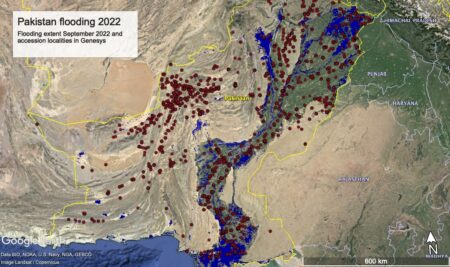- Handy primer on the effects of climate change and biodiversity on food security, courtesy of the House of Lords.
- Crop wild relatives could help with all three.
- Trouble brewing for rice. House of Lords nodding wisely.
- The trouble that brewed for wheat wasn’t quite as advertised. Spoiler alert: the price spike had to do with China buying up all it could. So is rice next then?
- No trouble brewing for yams now that they’re getting sequenced.
- Nor for peanuts in the Gambia, for different reasons.
- Sounds like everything is hunky dory for the Tuscan grape too.
- Good to see SADC is on the job.
- It may be too late for some trees though.
After the flood
Pakistans farmers are going to need seeds after the floodwater recede. That could include local landraces, if we start planning for it now. Here’s a map of the current extent of flooding, plus the collecting localities of crop landraces conserved in genebanks around the world, according to Genesys.
Brainfood: Canadian berries, Durian, Watermelon domestication, Wild cacao, New Chinese fruit, Animal pollinators, Food impacts
- Berries as a case study for crop wild relative conservation, use, and public engagement in Canada. Berries could be an agrobiodiversity conservation flagship, at least in Canada. If only other types of crops, and countries, were that easy.
- The king of fruits. There’s a dark side to durian that’s thankfully not there with berries.
- Genome sequencing of up to 6,000-yr-old Citrullus seeds reveals use of a bitter-fleshed species prior to watermelon domestication. Neolithic Libyans used wild watermelons for their seeds, not flesh.
- Comparison of bioactive components and flavor volatiles of diverse cocoa genotypes of Theobroma grandiflorum, Theobroma bicolor, Theobroma subincanum and Theobroma cacao. Could use the wild relatives for tastier chocolate. Another potential flagship, surely.
- Akebia: A Potential New Fruit Crop in China. I’d totally try it. And not just because it’s called both “wild banana” and “chocolate vine.”
- Animal pollination increases stability of crop yield across spatial scales. Not just higher yields, greater yield stability too. Important for some of the above, and many other fruits.
- Estimating the environmental impacts of 57,000 food products. More nutritious foods tend to be more environmentally friendly too. But how many of these products include the above? I mean fruits, not pollinators.
Nibbles: Forgotten crops special issue, Coffee fingerprinting, Three Sisters, Food gardening, Magic mushrooming, Genebanks in Ukraine, Colombia, Australia, China
- Forthcoming special issue of Plants, People, Planet on forgotten crops. Get your paper in about how they’re under-represented in genebanks.
- Or about how they need to be DNA fingerprinted, like the USDA is doing for coffee.
- I wonder if there is a forgotten crops version of the Three Sisters. Answers on a postcard, please.
- Forget about genebanks, grow those forgotten crops in your garden. Rebelliously.
- Forget about forgotten crops, how about forgotten mushrooms?
- Lest we forget the Ukrainian genebank.
- No way to forget the Future Seeds genebank.
- Australians are not being allowed to forget about genebanks, plant and animal. With video goodness. There’s hope yet.
- Meanwhile, in China…
Brainfood: Convivial conservation, Resilient forests, Traditional industries, Wheat supplies, Food system transformation, Micronutrient security, Biotech promise, Ultra-processed food impacts, Sub-Saharan agriculture, Farmer risk management, Afro-Brazilian agriculture, Biodiversity funding
- Exploring Convivial Conservation in Theory and Practice: Possibilities and Challenges for a Transformative Approach to Biodiversity Conservation. Conservation should be integrative, democratic and redistributive. Hard row to hoe.
- Emerging signals of declining forest resilience under climate change. Convivially or not, better conserve forests quickly.
- Adapting traditional industries to national park management: A conceptual framework and insights from two Chinese cases. Integrative and redistributive, but I’m not sure how democratic.
- Near- to long-term measures to stabilize global wheat supplies and food security. There’s a bunch of stuff that we can do in the short term, but in the end we’re going to need diverse, gender-equitable agro-ecosystems which are properly supported by investment in research. Sort of integrative, democratic and redistributive then, perhaps?
- From food price crisis to an equitable food system. Looks like the food system needs to be as convivial as conservation. If not more so.
- Trade and dietary preferences can determine micronutrient security in the United Kingdom. Going to be difficult to take back control of micronutrient security.
- Turning promise into practice: Crop biotechnology for increasing genetic diversity and climate resilience. Maybe biotech needs to be more convivial too.
- A conceptual framework for understanding the environmental impacts of ultra-processed foods and implications for sustainable food systems. Nothing convivial about ultra-processed foods, alas.
- Why food insecurity persists in sub-Saharan Africa: A review of existing evidence. Exports, basically. Looks like exports are really not very convivial.
- Crops in crises: Shocks shape smallholders’ diversification in rural Ethiopia. Farmers need continual access to both the informal and formal seed systems to mitigate risk, but poor farmers need more money to do so. Maybe link them up to export markets? No, wait…
- Traditional Agriculture and Food Sovereignty: Quilombola Knowledge and Management of Food Crops. Lots of conviviality, but not enough to fully mitigate risk.
- The role of international cooperative initiatives in financing biodiversity. Partnerships between state and a variety of non-state actors may just be an opportunity for more convivial conservation and food systems. But then I would say that.
